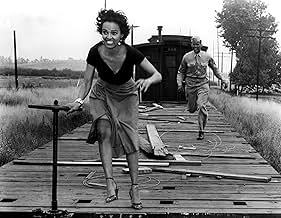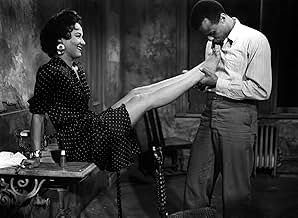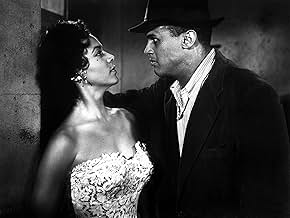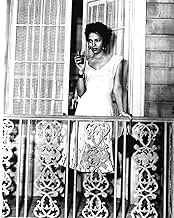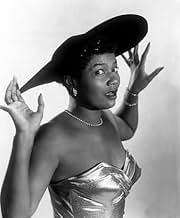ÉVALUATION IMDb
6,7/10
6,1 k
MA NOTE
Ajouter une intrigue dans votre langueContemporary version of the Bizet opera, with new lyrics and an African-American cast.Contemporary version of the Bizet opera, with new lyrics and an African-American cast.Contemporary version of the Bizet opera, with new lyrics and an African-American cast.
- Nommé pour 2 oscars
- 5 victoires et 8 nominations au total
Brock Peters
- Sergeant Brown
- (as Broc Peters)
LeVern Hutcherson
- Joe
- (voice)
- (as Le Vern Hutcherson)
Marilyn Horne
- Carmen Jones
- (voice)
- (as Marilynn Horne)
Marvin Hayes
- Husky Miller
- (voice)
Alvin Ailey
- Dance Soloist
- (uncredited)
DeForest Covan
- Trainer
- (uncredited)
Joseph E. Crawford
- Dink Franklin
- (singing voice)
- (uncredited)
Carmen De Lavallade
- Dance Soloist
- (uncredited)
Bernie Hamilton
- Reporter
- (uncredited)
Margaret Lancaster
- Singing Voice
- (uncredited)
Histoire
Le saviez-vous
- AnecdotesEartha Kitt was offered the role of Carmen, but the studio wanted her singing voice to be dubbed, so that her character would have an operatic voice. The same offer was made to Harry Belafonte and Diahann Carroll who accepted, but Kitt refused, wanting to use her natural voice. Dubbing was not required for Pearl Bailey, whose own voice suited her comedic songs.
- GaffesThe story takes place circa 1944, but all of the women's fashions and hairstyles are strictly 1954; when Carmen and Frankie are talking outside the Chicago Pawn Shop, 1950s-era automobiles passing by can clearly be seen reflected in the showcase window.
- Citations
Carmen Jones: I always did want to see the big town.
Frankie: You got your wish, honey. Somethin' tells me Chicago's gonna be real good for you.
Myrt: Somethin' tells me you gonna be real *bad* for Chicago.
- Générique farfeluThe opening credits and end title are set around a flaming rose.
- ConnexionsFeatured in Small Steps, Big Strides: The Black Experience in Hollywood (1998)
Commentaire en vedette
It's incredible that it took an Austrian director, Otto Preminger, the courage to bring this wonderful screen adaptation of the Bizet's immortal opera Carmen to the American public. As a musical, "Carmen Jones" had been seen, successfully, on Broadway, because of the many talented black performers that weren't allowed to be seen in Hollywood movies. Preminger had a knack for tackling issues that other, better known directors, stayed away from.
"Carmen Jones", as seen today, shows us a film that is somehow dated, but when it made its debut, it surprised a lot of people because it was a revolutionary work, something the American movie goers weren't used to seeing. The strength of the film lies in the performances Mr. Preminger got from his multi-talented cast.
The adaptation of the opera sets the film in the South. We are taken to a military base during the war. The local people work in the factory, attached to the base, making parachutes and other war related equipment. Carmen Jones, is the sultry young woman who sticks out from the rest of her co-workers, not only by her beauty, which was obvious, but by the way she can reduce men to servitude, which is what happens to Joe, the man who is being promoted until fate intervenes and Carmen renders him useless.
The gorgeous Dorothy Dandridge made a magnificent Carmen Jones. In fact, this was Ms. Dandridge's best screen work because she smolders the screen every time she is seen in the film. Harry Belafonte is Joe, the man whose passion for the lovely Carmen will consume him and will not let him see straight. Pearl Bailey is a delight in her take of Frankie. Olga James is seen as the sweet Cindy Lou, the girl in love with Joe. Joe Adams, Brock Peters and a young Diahann Carroll are also seen in minor roles.
Some comments to the IMDb forum express their displeasure at the way the voices are heard. This seems to have been the only thing that Preminger should have worked with his collaborators Oscar Hammerstein II and Harry Kleiner into having the opera melodies sung naturally, the way one would expect Ms. Dandridge, who could sing, and of course, Harry Belafonte, a wonderful singer, to deliver them in a way that would have pleased those audiences not accustomed to hearing classical opera.
Regardless of what we think today, this was one of the breakthroughs that proved to America they could enjoy black performers on their merits and talent. Otto Preminger must be praised for being a pioneer in this field and for daring to be a man ahead of his time.
"Carmen Jones", as seen today, shows us a film that is somehow dated, but when it made its debut, it surprised a lot of people because it was a revolutionary work, something the American movie goers weren't used to seeing. The strength of the film lies in the performances Mr. Preminger got from his multi-talented cast.
The adaptation of the opera sets the film in the South. We are taken to a military base during the war. The local people work in the factory, attached to the base, making parachutes and other war related equipment. Carmen Jones, is the sultry young woman who sticks out from the rest of her co-workers, not only by her beauty, which was obvious, but by the way she can reduce men to servitude, which is what happens to Joe, the man who is being promoted until fate intervenes and Carmen renders him useless.
The gorgeous Dorothy Dandridge made a magnificent Carmen Jones. In fact, this was Ms. Dandridge's best screen work because she smolders the screen every time she is seen in the film. Harry Belafonte is Joe, the man whose passion for the lovely Carmen will consume him and will not let him see straight. Pearl Bailey is a delight in her take of Frankie. Olga James is seen as the sweet Cindy Lou, the girl in love with Joe. Joe Adams, Brock Peters and a young Diahann Carroll are also seen in minor roles.
Some comments to the IMDb forum express their displeasure at the way the voices are heard. This seems to have been the only thing that Preminger should have worked with his collaborators Oscar Hammerstein II and Harry Kleiner into having the opera melodies sung naturally, the way one would expect Ms. Dandridge, who could sing, and of course, Harry Belafonte, a wonderful singer, to deliver them in a way that would have pleased those audiences not accustomed to hearing classical opera.
Regardless of what we think today, this was one of the breakthroughs that proved to America they could enjoy black performers on their merits and talent. Otto Preminger must be praised for being a pioneer in this field and for daring to be a man ahead of his time.
- jotix100
- 3 janv. 2006
- Lien permanent
Meilleurs choix
Connectez-vous pour évaluer et surveiller les recommandations personnalisées
- How long is Carmen Jones?Propulsé par Alexa
Détails
- Date de sortie
- Pays d’origine
- Langue
- Aussi connu sous le nom de
- Oscar Hammerstein's Carmen Jones
- Lieux de tournage
- Southern Pacific railroad crossing at 8746 E Los Angeles Avenue, aka California Highway 118, Moorpark, Californie, États-Unis(scene where Carmen attempts escape from the Jeep)
- société de production
- Consultez plus de crédits d'entreprise sur IMDbPro
Box-office
- Budget
- 750 000 $ US (estimation)
- Durée1 heure 45 minutes
- Couleur
- Rapport de forme
- 2.55 : 1
Contribuer à cette page
Suggérer une modification ou ajouter du contenu manquant

Lacune principale
By what name was Carmen Jones (1954) officially released in India in English?
Répondre


